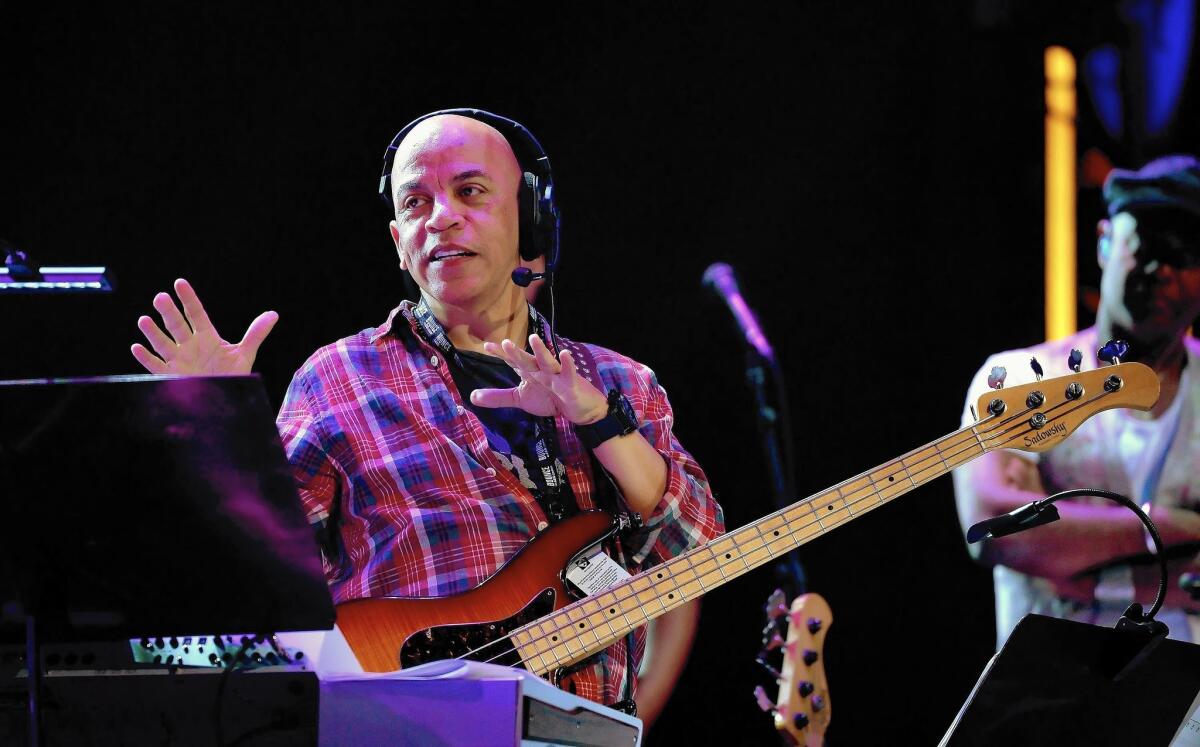The end of ‘American Idol’ ripples through pop music, affecting artists, musicians — and even the judges

Rickey Minor, “American Idol’s” veteran music director, is among those who’ll be affected by show’s cancellation.
- Share via
When the three judges of “American Idol” walked onstage for the production’s last show ahead of the grand finale that kicks off Wednesday night, they all spent a little longer than usual shaking hands in the front row before taking their seats. If Keith Urban, Jennifer Lopez and Harry Connick Jr. were going to make the fans feel special, this was the moment to do it.
Yet Urban saved what looked like his most meaningful embrace for Rickey Minor, “Idol’s” veteran music director. The country star even gave Minor a quick thumbs up, one creative professional saluting another for his years of below-the-line work.
The gesture was a reminder that for all the pop-cultural ground it’s lost since its 2006 peak, “Idol” remains a valued cog in the music-business machine. And though its disappearance may not upend TV as it once would have, a world without this show is unlikely to sound quite the same.
See the most-read stories in Entertainment this hour >>
For starters, Minor won’t be the only musician out of a job starting Friday. “American Idol” employs a large live band to accompany its contestants, providing regular gigs at a time when the collapse of recorded-music sales has led players to rely more than ever on performing to make a living.
The series’ success has dramatically boosted the amount of music we see on-screen — think of the seemingly countless awards shows that have flourished in “Idol’s” wake and the increasingly frequent music bits on late-night TV. (Minor himself left “Idol” to join “The Tonight Show” before returning in 2014.)
Alas, James Corden’s wildly popular “Carpool Karaoke” segment requires no experienced backup vocalists in need of employment.
Producers and songwriters are facing some market shrinkage as well. In a sense, “Idol” can be seen as having laid the groundwork for the current pop economy, in which star singers hire studio pros on a track-by-track basis rather than teaming with a single collaborator for an entire project.
The steady flow of content from dozens of “Idol” alums created a huge demand for the services of these freelancers, some of whom went on to create hits for the likes of Katy Perry and Taylor Swift. One of them, songwriter Kara DioGuardi, even became a judge on the show.
But without the “Idol” pipeline, where will the next Shellback hone his or her craft?
Not all the changes will happen behind the scenes — although that’s certainly where copyright holders, accustomed to having their songs performed for a price on TV, are lamenting the imminent interruption in their revenue streams. Established artists and former “Idol” contestants have long used appearances on the show to promote new work before a sympathetic audience that can still reach into the millions.
Kelly Clarkson’s “Piece by Piece,” for instance, topped Billboard’s digital songs chart after she sang the tune on the Feb. 25 episode. And last week, Urban jumped out of his judge’s chair to do his latest single, “Wasted Time,” which Connick helpfully introduced as “what just might be [Urban’s] 21st No.1 song.”
You can bet nobody is looking forward to losing that platform. Ditto the opportunity “Idol” gives its celebrity judges to flex aspects of their personalities conveyed less effectively by their music. Connick, in particular, has been something of a revelation in his three seasons, showing off his deep knowledge and raffish charm even as his last few records have failed to attract widespread interest.
But perhaps the singer and pianist has already accepted the upheaval that “Idol’s” cancellation will bring to pop music. His next gig is a daytime talk show expected to debut in September.
Twitter: @mikaelwood
More to Read
The biggest entertainment stories
Get our big stories about Hollywood, film, television, music, arts, culture and more right in your inbox as soon as they publish.
You may occasionally receive promotional content from the Los Angeles Times.











